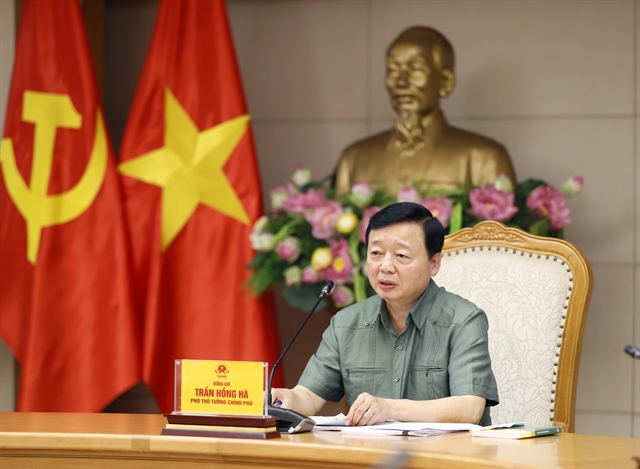 Politics & Law
Politics & Law


|
| Deputy Prime Minister Trần Hồng Hà gives instruction at the conference. — VNA/VNS Photo Văn Điệp |
HÀ NỘI — Deputy Prime Minister Trần Hồng Hà has emphasised the need for regulations on decentralisation in construction and transport to be aligned with financial and investment mechanisms and policies.
He made this request while chairing a conference with ministries and local authorities on Thursday afternoon at the Government headquarters.
The conference, conducted both in-person and online, focused on the decree governing decentralisation and authority division in construction and transport, particularly in the context of restructuring administrative apparatuses and organisng two-level local governance.
Proposal
The Ministry of Construction (MoC) has reviewed nearly 600 legal documents, proposing 66 regulatory adjustments to enhance decentralisation and authority division. These include nine laws, one resolution from the National Assembly Standing Committee, 28 decrees, one decision by the Prime Minister, and 27 circulars.
Minister of Construction Trần Hồng Minh stated that the draft decree on local government decentralisation would transfer 90 administrative tasks from the district level to the commune level.
Additionally, one task will be shifted to the provincial level, while another task will be decentralised from provincial people's committees to construction divisions.
In the construction and transport sectors, the MoC has proposed decentralising 21 governmental authorities—currently under the Government and Prime Minister—to the Minister of Construction, while transferring three authorities to local administrations. Additionally, 28 authorities under the Minister of Construction and MoC’s specialised agencies will be delegated to local authorities.
Following careful research and review, the MoC has put forward comprehensive decentralisation measures aimed at enhancing local autonomy and reducing administrative pressure on the PM.
Upon implementation, the Central Government will retain control over key national responsibilities, including railway infrastructure, highly technical and specialised matters that cannot be delegated to localities, as well as national defence and security tasks, such as airspace management and international treaties.
Some areas only retain one or two tasks for the Central Government to perform, such as the road sector, only managing special national highways.
In urban and rural planning, four tasks of the PM will be decentralised to local authorities, one task will be assigned to the Ministry of National Defence and the Ministry of Public Security.
Five tasks from the Minister of Construction will be delegated to local authorities, while 14 tasks at the district level will be transferred to the commune level. Additionally, one task will be assigned to divisions of construction, and one task to provincial people's committees.
Following the implementation of decentralisation and power delegation, the MoC will primarily focus on management responsibilities, including developing planning, strategies, legal frameworks, mechanisms, policies, standards, technical regulations, and economic-technical norms, as well as carrying out inspection and supervisory functions.
Localities will be granted greater autonomy, enabling them to independently manage tasks within their jurisdiction without needing to consult or report to the Government, Prime Minister, or ministries, while ensuring alignment with the directives of Party and Government leaders.
During the meeting, local representatives shared their perspectives on decentralisation and power delegation to the commune level, focusing on the implementation of new responsibilities in construction, housing management, traffic infrastructure, and urban development.
They emphasised the need for clear guidelines on the conditions for implementation, particularly regarding job positions for specialised units at the commune or ward level.
Representatives agreed that these decrees hold critical importance, especially in the restructuring of local authorities under the new governance model.
Guidance
Concluding the conference, Deputy PM Hà directed the MoC to finalise the draft decrees, ensuring a clear and well-defined scope for decentralisation and authority delegation from the Government, the Prime Minister, and ministers to the local level, while preventing overlaps or gaps in governance.
He emphasised that the MoC should carefully review and incorporate relevant provisions on decentralisation and power delegation that have been adjusted in amended laws set to take effect on July 1 next year, along with related legislation such as the Law on the Organization of the Government.
The Deputy PM has directed the MoC to actively engage with localities, incorporating their feedback to refine and clarify specific principles and criteria for determining which tasks should remain at the provincial level.
These include projects under target programmes previously assigned to the district level, initiatives with inter-commune scope, and administrative procedures requiring high technical expertise, qualified personnel, and specialised infrastructure—such as technical centers.
Additionally, management areas requiring dedicated facilities and staff capacity, including those related to disease prevention, disaster and flood response, as well as national defense and security, must strictly comply with current regulations.
Deputy PM Hà has also tasked local authorities with carefully reviewing and contributing insights on decentralisation and authority delegation, ensuring alignment with both legal frameworks and practical implementation conditions. — VNS




